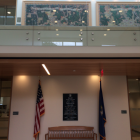Government
‘It Is Our Constitution’: Public Hearing Wednesday on Suggested Changes To Town Charter
|
The volunteer panel charged with studying and recommending changes to New Canaan’s major governing document is calling for residents to make their voices heard at a public hearing to be held Wednesday night. New Canaan’s Charter “is our Constitution,” according to Dave Hunt, chairman of the Charter Revision Commission, which has been meeting regularly since last fall. “It is serves that function, so it sets the stage for the standards for all of government,” he said. “So our task is to review that and try to have the best possible government for the town of New Canaan, and to make changes where we see an opportunity to make things better, understanding that you have to think about consequences that may be in the opposite direction.”
The public hearing is scheduled for 7 p.m. in the Town Meeting Room. A draft copy of the commission’s report to the Town Council can be found here on the town website and as a PDF at the end of this article.



